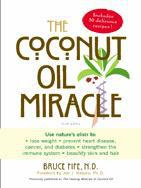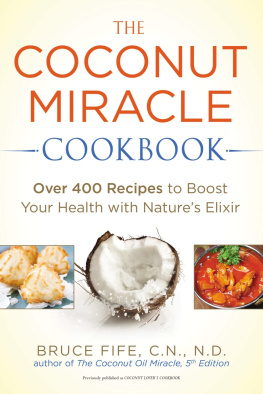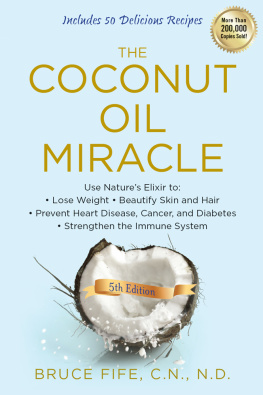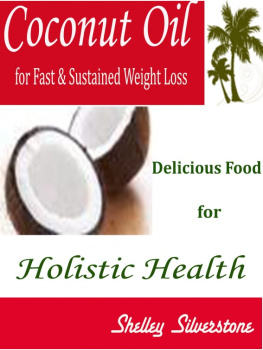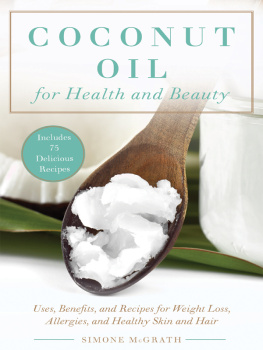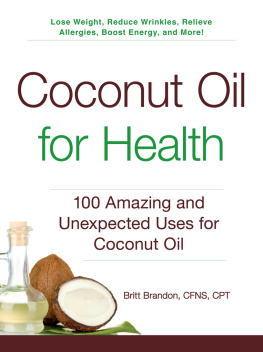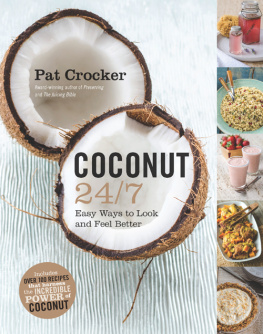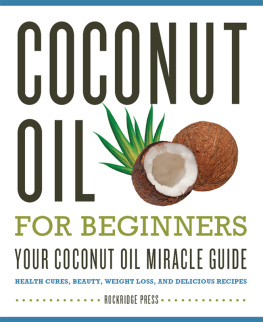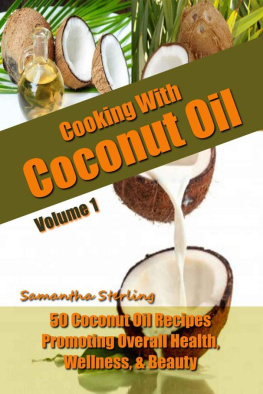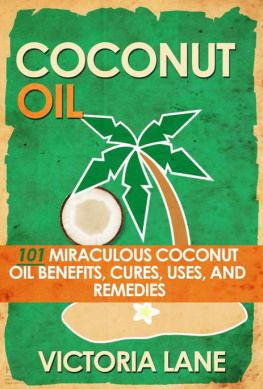
THE COCONUT OIL MIRACLE
THE COCONUT OIL MIRACLE
BRUCE FIFE, C.N., N.D.
Previously published as The Healing Miracles of Coconut Oil
AVERY. A MEMBER OF PENGUIN GROUP (USA) INC. NEW YORK
Every effort has been made to ensure that the information contained in this book is complete and accurate. However, neither the publisher nor the author is engaged in rendering professional advice or services to the individual reader. The ideas, procedures, and suggestions contained in this book are not intended as a substitute for consulting with your physician. All matters regarding your health require medical supervision. Neither the author nor the publisher shall be liable or responsible for any loss or damage allegedly arising from any information or suggestion in this book.
The recipes contained in this book are to be followed exactly as written. The publisher is not responsible for your specific health or allergy needs that may require medical supervision. The publisher is not responsible for any adverse reactions to the recipes contained in this book.
While the author has made every effort to provide accurate telephone numbers and Internet addresses at the time of publication, neither the publisher nor the author assumes any responsibility for errors or for changes that occur after publication.
Most Avery books are available at special quantity discounts for bulk purchase for sales promotions, premiums, fund-raising, and educational needs. Special books or book excerpts also can be created to fit specific needs. For details, write Penguin Group (USA) Inc. Special Markets, 375 Hudson Street, New York, NY 10014.

a member of
Penguin Group (USA) Inc.
375 Hudson Street
New York, NY 10014
Copyright 1999, 2000, 2002, 2004 by Bruce Fife
Previously published as The Healing Miracles of Coconut Oil by Piccadilly Books All rights reserved. No part of this book may be reproduced, scanned, or distributed in any printed or electronic form without permission. Please do not participate in or encourage piracy of copyrighted materials in violation of the authors rights. Purchase only authorized editions.
Library of Congress Cataloging-in-Publication Data
Fife, Bruce, date.
The coconut oil miracle / Bruce Fife.[Rev. ed.]
p. cm.
Rev. ed of: The healing miracles of coconut oil. 2001.
Includes bibliographical references and index.
ISBN: 1-4295-2048-5
1. Coconut oilHealth aspects. 2. Coconut oilTherapeutic use. 3. Fatty acids in
human nutrition. I. Fife, Bruce, 1952Healing miracles of coconut oil. II. Title.
QP752.F35F545 2004 2004046256
615'.3245dc22
CONTENTS
THE TRUTH ABOUT COCONUT OIL
UNDERSTANDING FATS
A NEW WEAPON AGAINST HEART DISEASE
NATURES MARVELOUS GERM FIGHTER
EAT FAT, LOSE WEIGHT
BEAUTIFUL SKIN AND HAIR
COCONUT OIL AS FOOD AND AS MEDICINE
EAT YOUR WAY TO BETTER HEALTH
RECIPES FOR NUTRITION AND BEAUTY
Resources References Index About the Author
FOREWORD
U p until now only a small group of lipid (fat) researchers were familiar with the incredible health benefits of a unique group of saturated fats found in coconut oil. Most of those in the health care industry have been generally ignorant of these benefits, shunning coconut oil because of common misconceptions regarding dietary fat. But this situation is beginning to change as the amazing nutritional and therapeutic benefits of the tropical oils become better known.
In this book the reader will learn that not all saturated fats are unhealthy. In fact, there is a subgroup of saturated fats that actually have a positive effect on your health. This book provides a brief summary of the remarkable health benefits lipid researchers have slowly been uncovering regarding a unique group of saturated fats found in mothers milk and coconut oil known as medium-chain fatty acids. The story is fascinating and can have a pronounced effect on your health.
Those who take the time to pick up this book may be surprised to learn that these saturated fats promote good health. Contrary to what is generally believed by both the lay public and medical professionals, the saturated fats found in coconut oil are actually good for you. This should not be surprising, because if coconut oil were unhealthy it would have been evidenced in populations who have used it for generations. In fact, just the opposite is the case. Those populations who use coconut oil demonstrate a remarkable level of good health.
Historically, coconut oil is one of the earliest oils to be used as a food and as a pharmaceutical. Ayurvedic literature has long promoted the health and cosmetic benefits of coconut oil. Even today the Asian Pacific community, which may represent as much as half the worlds population, uses coconut oil in one form or another. Many of these people enjoy remarkably good health and longevity. Studies on people who live in tropical climates and who have a diet high in coconut oil show that they are healthier and have fewer incidences of heart disease, cancer, digestive complaints, and prostate problems. In North America and Europe popular cookbooks from the late nineteenth century often included coconut oil in many recipes, yet heart disease and cancer were almost unheard of at the time. Common sense would suggest that the saturated fats in coconut oil are not the poisons they are often made out to be.
Why, then, all the negative publicity regarding coconut oil? Since it is thought that saturated fats are involved in heart disease, coconut oil has been considered a health risk. Much of the information linking coconut oil and increased heart disease is, however, circumstantial at best and flawed at worst. Studies showing that dietary coconut oil raises blood cholesterol and increases the possible risk of heart disease were poorly conceived because the essential fats were not included in the diet. Populations with high levels of coconut oil consumption always include other oils from vegetables and fish for a more balanced diet.
Both scientific and political propaganda by the American Soybean Association and the Center for Science in the Public Interest (or is it their own?) have joined forces in a campaign to replace tropical oils with polyunsaturated soybean oil from American farmers. Because of this campaign, food processors and restaurant and theater chains have switched from coconut to polyunsaturated oils. Even dietetic and medical spokespersons, blinded by negative publicity, have supported the switch to polyunsaturated oils as heart healthy. This campaign has condemned all saturated fats as generically poison. Both the lay and scientific press fail to mention the fact that certain subgroups of saturated fats have positive health benefits.
The abundance of documented scientific facts reviewed for this book will tell, as Paul Harvey would say, the rest of the story. As the story unfolds, the reader can better appreciate the fact that saturated fats are classified into two primary categories: (1) long-chain fats and (2) short-and medium-chain fats. Each subgroup has markedly different biological effects. It will be shown that the overconsumption of polyunsaturated fats in our diet is more detrimental to our health than the saturated fats found in tropical oils.
Not only is coconut oil not a dietary poison, but it contains a remarkable fat called monolaurin. This medium-chain fat, first discovered in my laboratory, represents one of the most exceptional and inspiring groups of fats found in nature. This unique fat, available naturally from mothers milk and coconut oil, is now commercially available as Lauricidin. Monolaurin (Lauricidin) is currently being tested in clinical trials as a treatment for genital herpes, hepatitis C, and HIV. Early clinical results have been very promising and show exciting possibilities for an important new weapon in alternative medicine.
Next page
